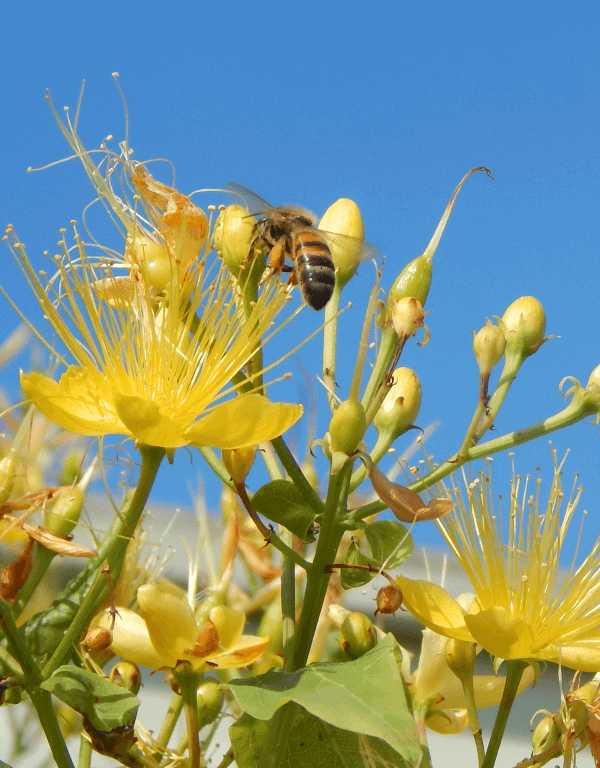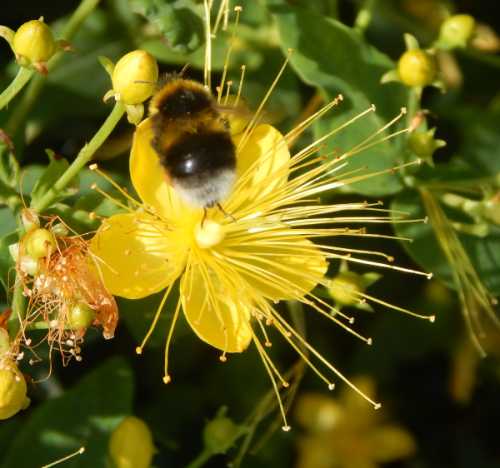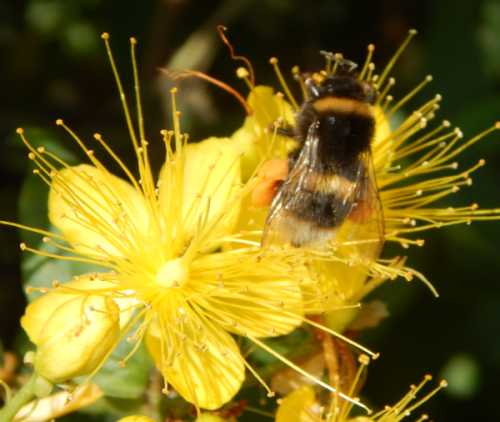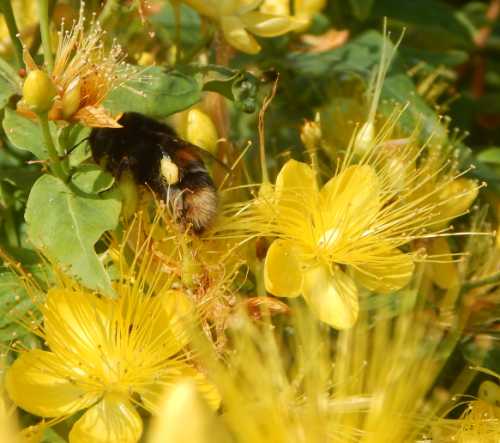Bees Like Hypericum Flowers
Updated: 1st May 2021
I love Hypericum shrubs. I adore the cheerful yellow flowers and the berries afterwards (the seeds inside the berries are eaten by some bird species).
It can be quite comical to watch bees, especially fat bumble bee queens and large workers, landing, and almost bouncing on the stamens, which on some varieties are rather long - these are specimens I advise selecting for a bee garden.
Of course, Hypericum (also known as St John's Wort, or Gold flower), provide a bounty of pollen for bees, as can be seen by the full pollen baskets on the bumble bee above. They have a good flowering period too, from summer through to autumn. In other words, they are typically in bloom at a time when colonies are growing and are particularly busy.
I have a Hypericum shrub in my garden which I put in place a couple of years ago. It's still quite small, but I'm also fortunate enough to live fairly close to a boundary hedgerow that has several well established specimens. It gets covered in bees every year.
Bees love hypericum flowers!
Most often, I tend to notice honey bees and bumble bees on the flowers, although some solitary species may also be observed. Other pollinators like Hypericum too, especially hover flies.
These shrubs are fairly easy to grow, being attacked by relatively few invertebrates, and not being especially disease-prone (although they can succumb to a condition known as Hypericum rust). Give them a sunny spot, ensuring the shrub will have plenty of space to spread (according to the variety).
 Honey bee Apis mellifera foraging on Hypericum.
Honey bee Apis mellifera foraging on Hypericum. Watching a bumble bee land on a Hypericum flower with long stamens is great fun.
Watching a bumble bee land on a Hypericum flower with long stamens is great fun.
Which Hypericum Varieties Do Bees Like?
I recommend selecting a perennial type (apparently, annuals are available). As stated above, I tend to prefer specimens with long stamens. Not only will the bees like them, but I'll enjoy watching chubby bumble bees landing on them. Here are a few varieties to look out for:
- Hypericum subsessile
- Hypericum grandiflorum
- Hypericum olympicum
- Hypericum androseamum
- Hypericum monogynum
 St John's Wort provides a bounty of pollen for bees.
St John's Wort provides a bounty of pollen for bees.Remember that one of the advantages of having bee-friendly shrubs in your garden is that foraging can be more efficient for bees due to the close proximity of many flowers. This of course means that the bee will use less of its energetic resources flying from flower to flower (they may even be able to clamber about from one flower head to the next).
 Foraging on shrubs can be more efficient for bees due to the close proximity of many flowers.
Foraging on shrubs can be more efficient for bees due to the close proximity of many flowers.
Growing Hypericum For Bees
Hypericum can be grown from semi-hardwood cuttings. However, the wild variety is particularly known for its self seeding capability, and it is possible to cultivate this shrub if seeds are available.
A sunny spot and well-drained soil should keep this shrub and the bees happy, although many soil types may be suitable.
More articles about bees about bees and flowering plants
- Bees And Pollinators Love Sneezeweed - A 'coneflower' Bees And Pollinators Love Sneezeweed - Bringing a wonderful splash of golden orange, copper and yellow to the flower border bees and love this cheerful flower.
- Plant Oregano For Bees (Marjoram) Plant Oregano For Bees: bees love oregano (marjoram). It's rich in nectar, and attracts bees, butterflies and hoverflies in summer. Here's how to plant it.
- Bees Love Japanese Anemones - A Lovely Autumn Flowering Plant For Bees Japanese anemones provide lots of pollen for bees during Autumn. Honey bees, bumble bee species and hoverflies are especially keen.
- Which Dahlias Do Bees Like? Which Dahlias Do Bees Like? These lovely plants offer a variety of gorgeous blooms that are popular with bees, butterflies and other pollinators.


